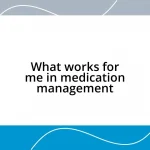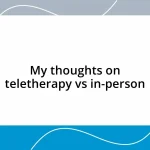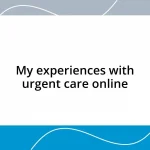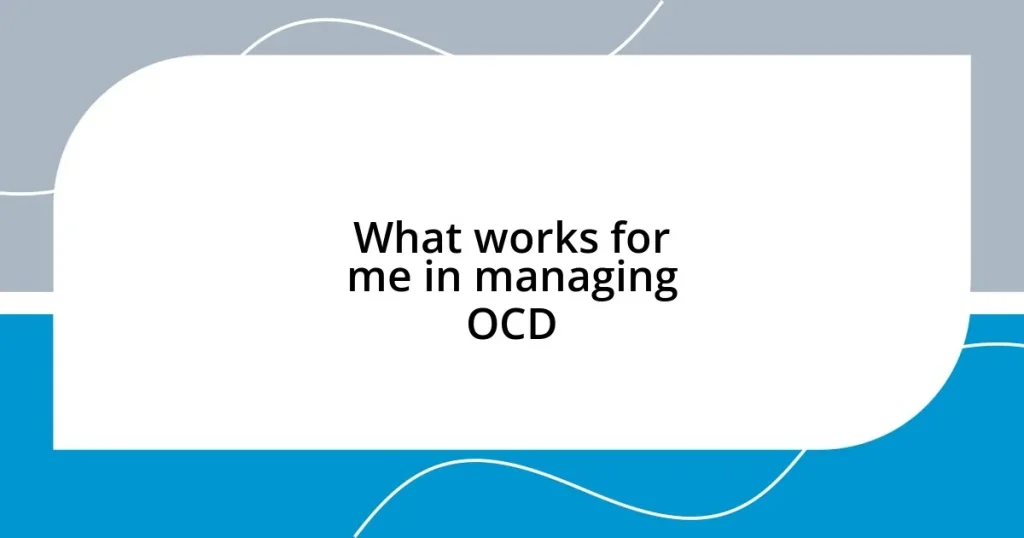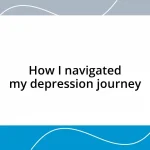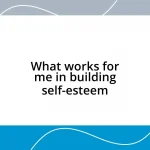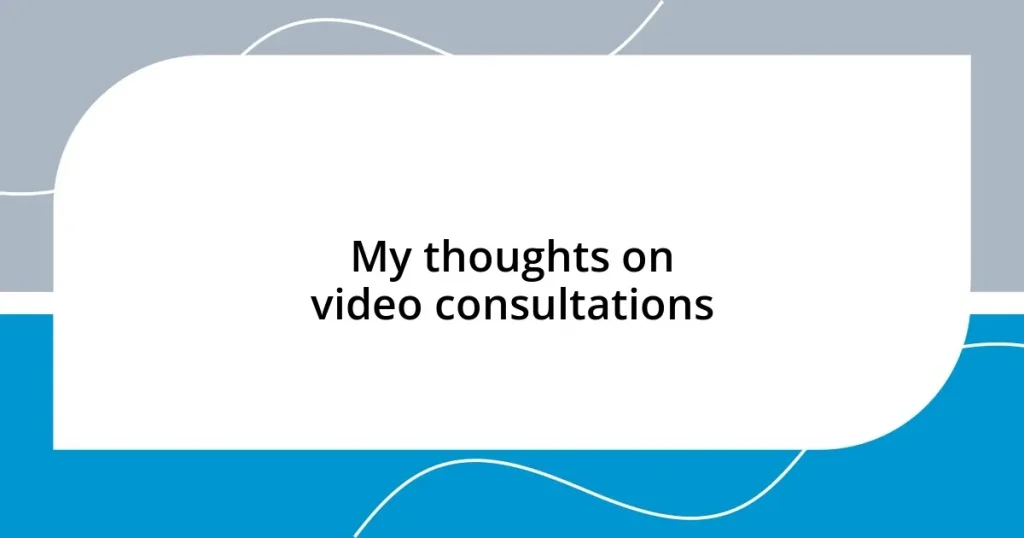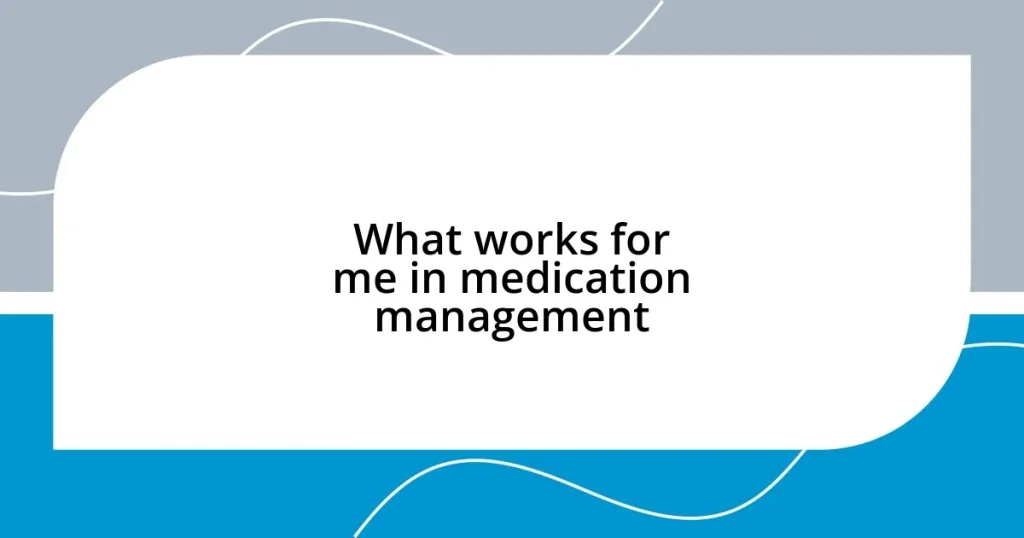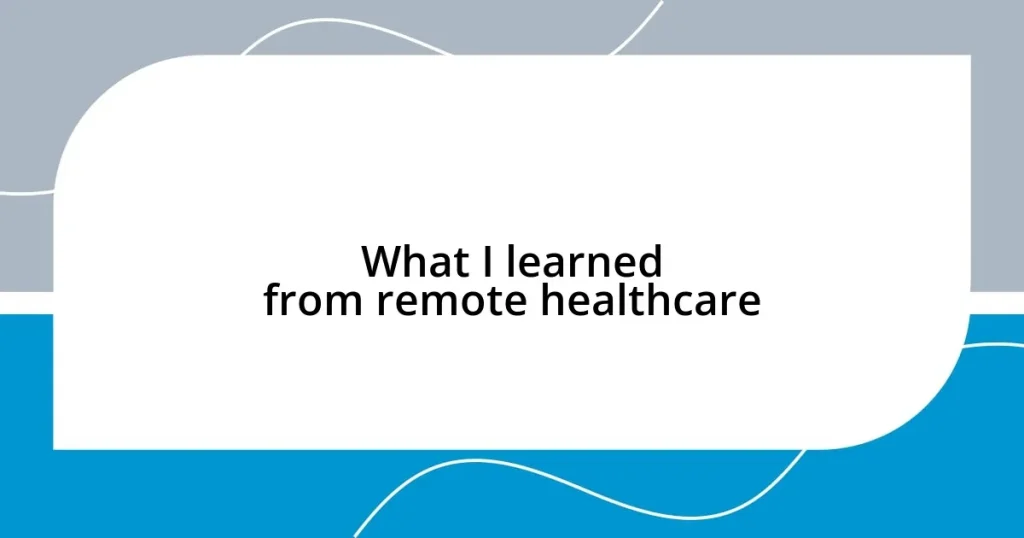Key takeaways:
- Recognizing and managing OCD triggers, such as cluttered environments and intrusive news, is essential for emotional control.
- Establishing daily routines with structured tasks and mindfulness practices significantly helps to reduce anxiety and compulsions.
- Utilizing cognitive restructuring and grounding techniques effectively challenges intrusive thoughts and builds confidence in handling OCD.
- Building a supportive network with friends, family, and peers who understand OCD is crucial for emotional support and practical advice.
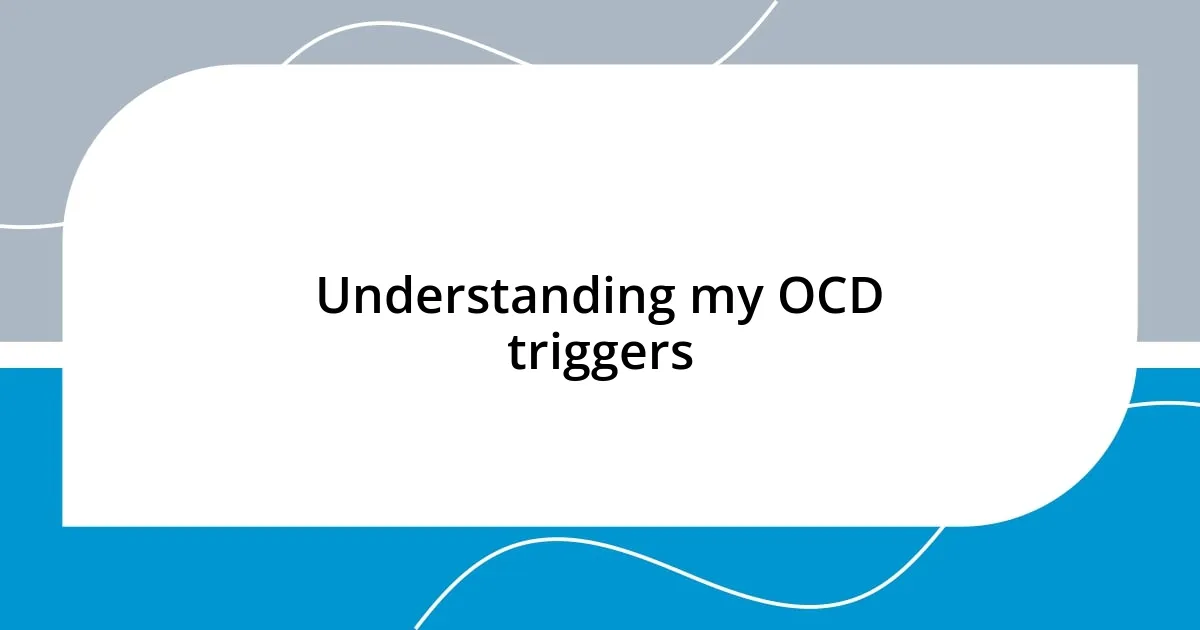
Understanding my OCD triggers
Recognizing my OCD triggers has been a crucial part of my journey. For instance, I’ve learned that certain environments, like a cluttered space, can send my mind spiraling into compulsions. In moments like these, I often ask myself, “Why does this bother me so much?” Reflecting on my feelings in these situations helps me regain control.
I remember a specific instance when a news story about disease outbreaks triggered my anxieties. The constant stream of information left me feeling helpless. Instead of battling these feelings alone, I sought support from friends who reassured me, allowing me to understand that it’s okay to feel overwhelmed sometimes.
These triggers aren’t just abstract concepts; they take a direct toll on my emotions. For example, when I’m faced with uncertainties, my mind races with “what-if” scenarios. I’ve found it beneficial to jot down my thoughts in a journal as a way to externalize and manage these emotions. By doing so, I create a dialogue with myself that helps clarify my feelings and diminishes the power these triggers have over me.
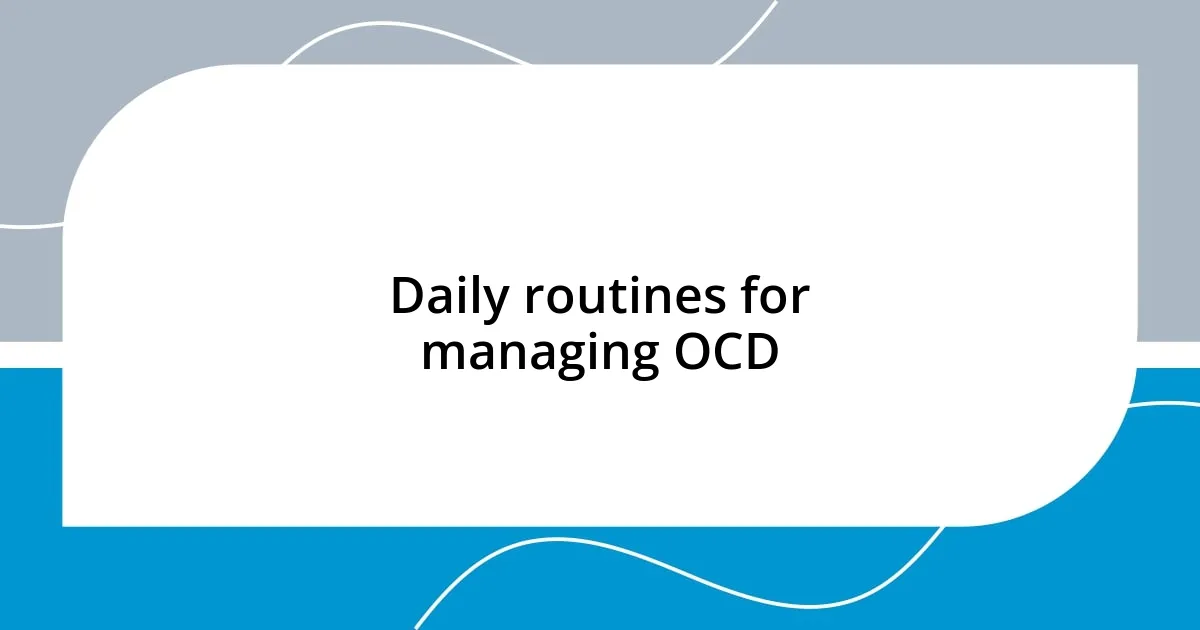
Daily routines for managing OCD
Daily routines have become my anchor in managing OCD. I’ve noticed that incorporating consistent habits helps reduce the unpredictability that often fuels my anxiety. For example, I’ve established a morning routine that includes stretching and mindfulness meditation. This simple ritual calms my racing thoughts and sets a positive tone for the rest of my day. I often reflect on how just a few minutes of focused breathing can make a world of difference.
One practice that I swear by is setting designated times for my tasks. When I structure my day into segments devoted to work, relaxation, and even chores, I find that my compulsions diminish. The act of writing down my schedule has become a comforting ritual in itself. I can almost feel the weight lift off my shoulders as I tick off completed tasks. It minimizes the overwhelming urge to keep rechecking things or falling into the trap of “just one more” excess.
Engaging in activities outside of my home, like a daily walk or even a quick coffee run, has proven invaluable. These moments provide me a healthy distraction, but I also use them to practice grounding techniques. Observing my surroundings or feeling the textures of the world keeps me rooted in the present, pulling my mind away from the spiral of OCD thoughts. Trust me, these little adjustments form a robust buffer against the grips of OCD.
| Daily Routine | Impact on OCD |
|---|---|
| Morning Meditation | Calms racing thoughts, smoothens the start of the day |
| Structured Task Lists | Reduces anxiety by creating a sense of control |
| Regular Outdoor Activities | Helps in grounding and shifting focus away from compulsions |
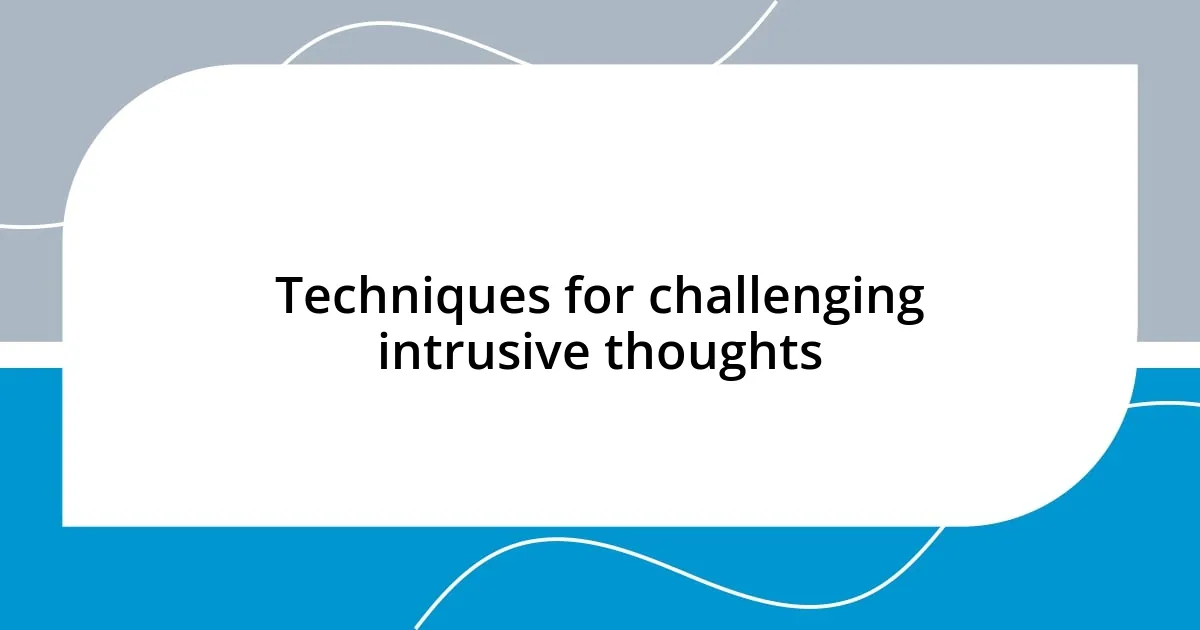
Techniques for challenging intrusive thoughts
Challenging intrusive thoughts can feel like a daunting daily battle. I remember a time when I’d be plagued by the fear of forgetting to lock the door. Instead of spiraling into compulsions, I started using a technique called cognitive restructuring. Essentially, I took a moment to question the validity of my thoughts. I’d ask myself, “Is there real evidence that I left it unlocked?” This simple shift in perspective often helps me regain control over my anxious mind.
One effective method I’ve discovered is distraction through mindful engagement. Whenever those nagging thoughts strike, I focus intently on an activity, whether it’s cooking or diving into a good book. This practice not only draws my attention away from the intrusive thoughts, but it also creates a space to reconnect with my surroundings. Additionally, here are some more techniques that have proven helpful for me:
-
Thought Stopping: Visualize a stop sign whenever intrusive thoughts arise. This helps halt the spiral before it gains momentum.
-
Reality Checking: List the facts about the fear, like “I locked the door, and I’ve done this hundreds of times without issue.” This empowers me to confront my anxiety logically.
-
Gratitude Journaling: At the end of each day, I write down three things I’m grateful for. This subtle shift in focus often diminishes the grip of intrusive thoughts and offers a fresh perspective.
Implementing these techniques has not only provided me with effective tools but has also increased my confidence in handling OCD.
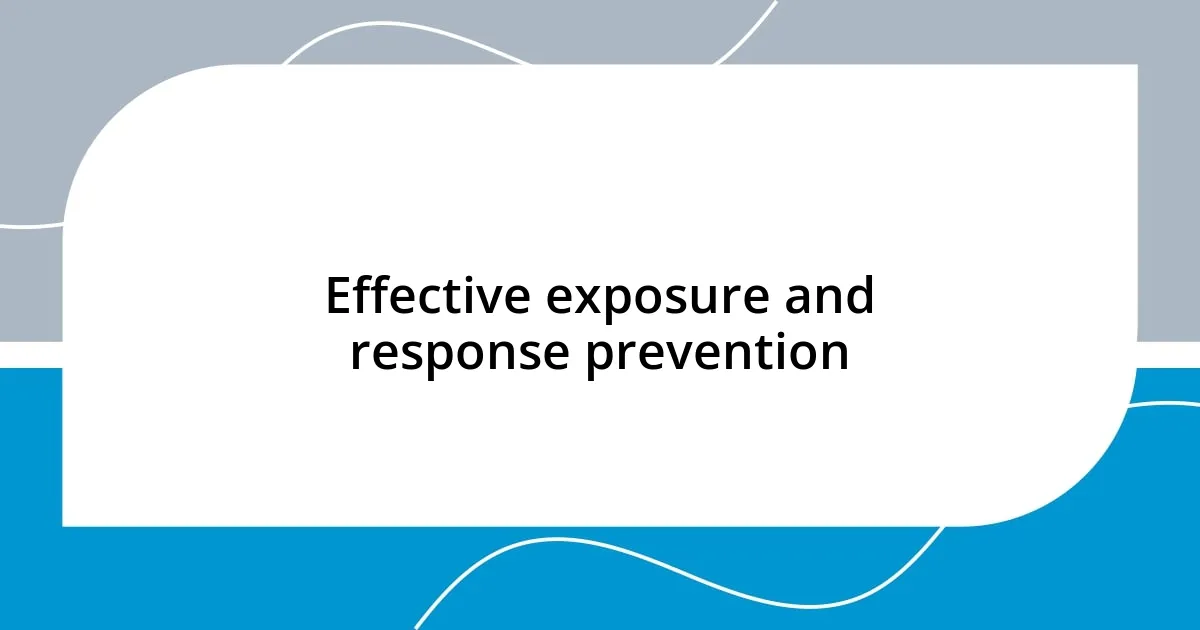
Effective exposure and response prevention
One approach that has transformed my relationship with OCD is exposure and response prevention (ERP). Initially, the idea of deliberately confronting my fears felt like standing at the edge of a cliff. But over time, I’ve learned how this method can be both empowering and liberating. I remember the first time I faced a trigger without engaging in compulsions; the anxiety skyrocketed at first, but then I felt a strange sense of pride for not giving in.
What I find particularly effective is breaking the exposure into manageable steps. For instance, when I was grappling with contamination fears, I started by touching a clean surface that I considered “safe” before gradually progressing to more challenging situations. Each small victory felt like a celebration, reinforcing my belief that I was regaining control over my life. Have you ever tried taking baby steps in the face of something daunting? It’s amazing how each step can build momentum and lessen the intensity of those fears.
Another aspect of ERP that resonates with me is the emotional release that comes after resisting a compulsion. I still vividly recall a day when I had an intense urge to check the stove, but instead, I chose to sit with the discomfort. It felt excruciating at first, but gradually, the anxiety began to ebb. I realized that the moment I embraced that anxiety without acting on it, my resilience grew. It’s a process that takes time, patience, and self-compassion, but the freedom gained has been absolutely worth it.
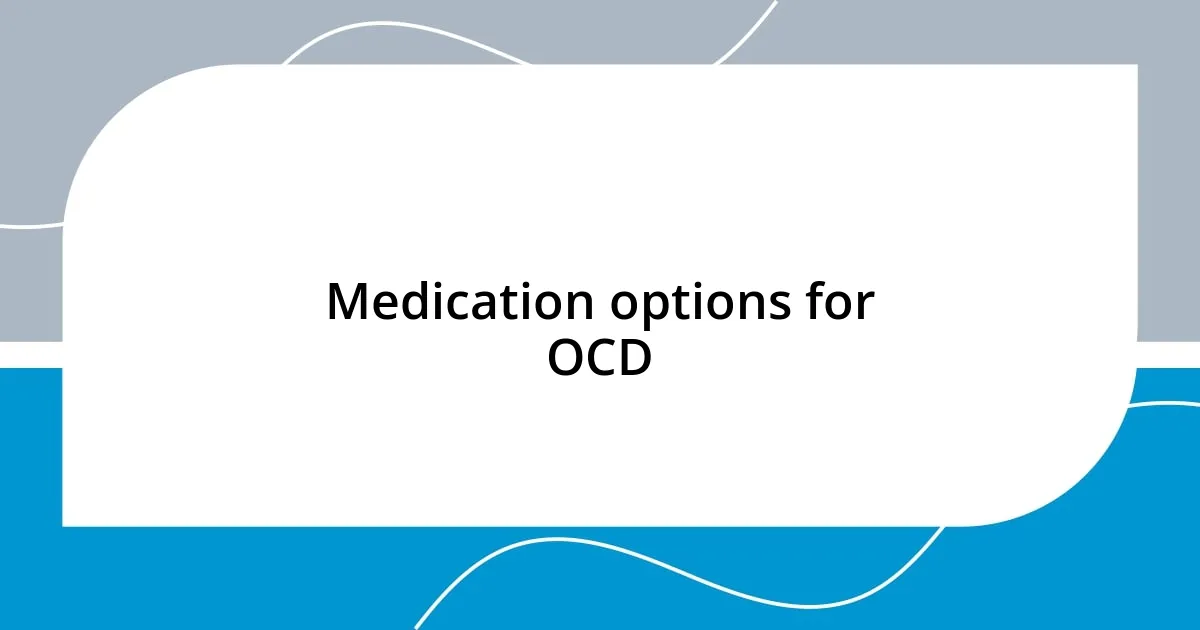
Medication options for OCD
When it comes to medication options for OCD, I’ve found that selective serotonin reuptake inhibitors (SSRIs) can be quite effective. Personally, I started on fluoxetine, and I noticed a difference within a few weeks. It’s fascinating how these medications can help balance brain chemistry, ultimately easing the grip of those relentless intrusive thoughts.
Another option that has crossed my path is clomipramine, a tricyclic antidepressant. While SSRIs are often the first line of treatment, clomipramine has shown promise, especially for those who may not respond well to SSRIs. I remember chatting with my therapist about giving it a try, thinking, “Is it worth exploring another avenue?” Sometimes, it pays to ask these questions because what might not work for one person could be a game-changer for another.
Lastly, it’s crucial to remember that medication isn’t a one-size-fits-all solution. I often encourage others to work closely with their healthcare providers to find the most suitable option for their unique journey. After all, managing OCD is deeply personal, and finding the right medication can take time—don’t be disheartened by the process; I can assure you, persistence often leads to relief.
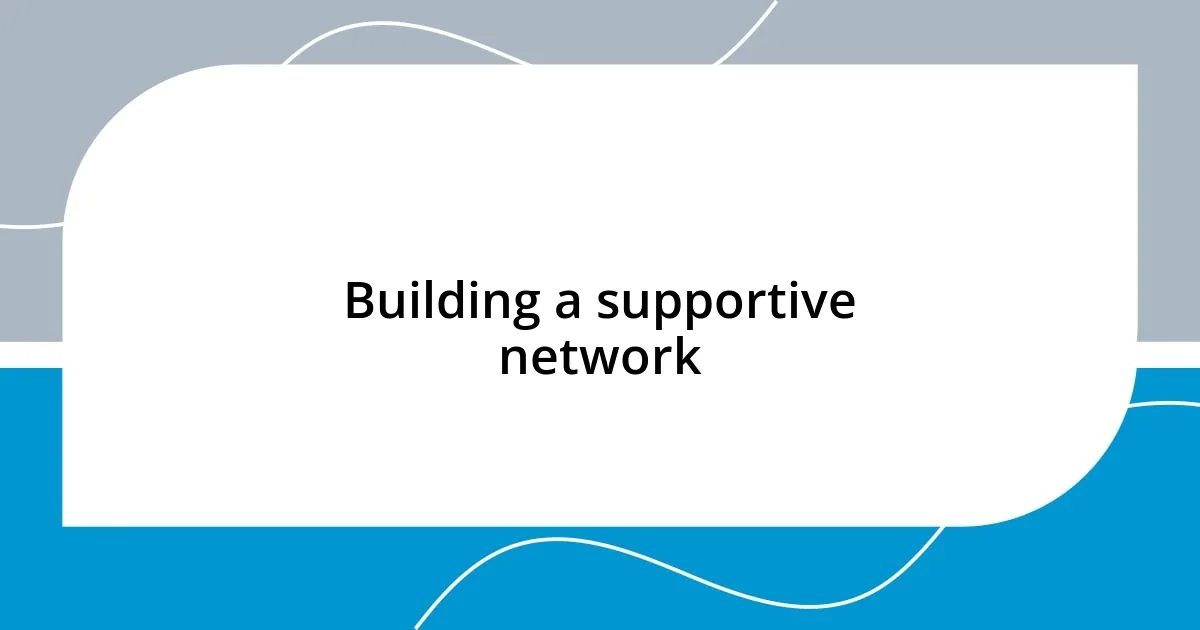
Building a supportive network
Building a supportive network has been a game-changer in my battle with OCD. I remember when I first reached out to friends and family about my struggles. The relief I felt when they listened and offered their support was monumental. It made me realize that sharing my experiences wasn’t just about seeking empathy; it also served as a reminder that I wasn’t alone in this journey.
I’ve found that connecting with others who understand OCD, whether through support groups or online forums, is incredibly empowering. Hearing stories from people facing similar challenges creates a bond that’s hard to describe. Have you ever felt that sense of camaraderie when someone gets exactly what you’re going through? Those connections can provide not only understanding but also practical advice that can make managing OCD feel a little less daunting.
Additionally, having a supportive network means having someone to lean on during tough times. There was a moment when I was overwhelmed with anxiety, and a close friend stepped in to help by discussing coping strategies and just being there. It’s so important to surround yourself with people who validate your feelings and encourage your progress. So, think about your own support system—who can you turn to when the going gets tough? Building these relationships is a critical step in the process of reclaiming your life from OCD.


